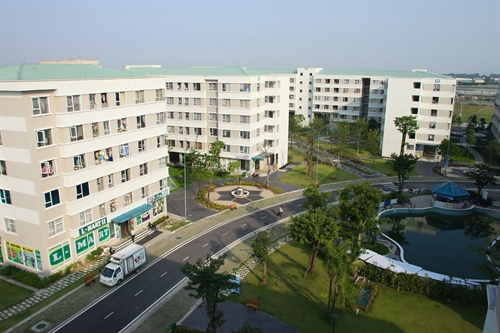 Society
Society

Violations of government low-income housing policies are increasing, despite authorities' efforts to tackle the issue.
 |
| A social housing project in Đặng Xá commune in Hà Nội’s Gia Lâm District. VNA Photo Tuấn Anh |
Compiled by Mai Phương
HÀ NỘI – “Why do you want to buy a low-priced social house when you already own a house?”
“Because I qualify and I can afford it.”
The answers surprised me.
Several people whom I know already own a house applied to buy low-priced social houses, too. Yet social houses are supposed to be sold only to poor people who don’t own a house as part of the Government’s low-income accommodation policies.
The primary qualification to buy a social house is that the buyer does not already own a house. Another qualifying factor is that each household member has less than 8sq.m of living space in a low quality home which is not State-supported.
So what’s happening?
“They are cheating, of course” said Nguyễn Hồng Sơn, an official specialising in administrative procedures for social housing projects in Hà Nội. The official is working for the Viglacera Corporation - a leading company in the construction industry in Việt Nam and one of the successful companies in the social housing sector.
Violations of the government low income housing policies are increasing, despite authorities’ actions to tackle the issue, Son said.
There are two main groups of violators. The first group includes real estate speculators who pay the social house homeowner more than the purchase price, then turn around and sell the social house for even more money than they paid for it. Such speculators earn alot of money this way. But it’s money illegally earned.
The second group of violators includes buyers who are not low-income people but who take advantage of “loopholes” in existing administrative procedures to buy a social house illegally.
To obtain a licence to buy a social house, one should show a certificate from his or her local administration that he/she is low-income, does not own a house, or is currently living temporarily in substandard accommodations.
"This creates opportunities for corrupt local administrative officials to collect bribes which are usually worth around VNĐ30 million (roughly US$1,400) from the illegal buyers," Sơn said.
In some cases, owners don’t live in their social houses but lend them illegally to others. Others illegally sell them to real estate speculators for profit.
If violations are discovered by administrative management authorities, the government reclaims the social houses and invalidates the purchase contracts.
Recently, Lao Động (Labour) newspaper reported a case concerning a social housing project at 30 Phạm Văn Đồng Street in Hà Nội’s Cầu Giấy District.
A real estate broker named Thành introduced himself as being able to provide social houses at better prices.
This is illegal as buyers are not allowed to sell their social houses during the first five years after the initial purchase. Contracts signed between sellers and buyers without any guarantee from a housing company or authority are not valid.
Thành said such trading was very risky but was very popular because demands for social housing were very high.
The price of a social house is normally VNĐ10-15 million ($450-670)per square metre, but after going through several illegal transactions the cost could reach VNĐ20-25 million (about $900-$1,100).
A Hà Nội Construction Department report said a total of about 10,000 social houses had been sold and put into use so far this year.
A very small number of violations were discovered, including two cases in a project on Ngô Thì Nhậm Street, Hà Nội’s Hà Đông District, the newspaper reported.
Many others violations remain undetected as authorities could not find proof with which to accuse the violators.
The Government should issue more accurate regulations with stricter punishment for violations, a deputy general director of the Việt Nam Construction Association (VNCA) said as quoted by the newspaper.
The VNCA deputy general director, who refused to give his name, told the paper violators only had to pay a fine of several million đồng, in addition to losing the house. After which, the total purchase price would be refunded to the original buyer.
“With such small punishment, violations are common,” said the official.
Recently, another report in the local newspaper Thời báo kinh doanh (Business Times) exposed issues in managing and developing social housing in HCM City and southern Đà Nẵng City.
The newspaper said about 16.7 per cent of the social houses inspected by the State Audit in HCM City in July last year - and 35.5 per cent of those in Đà Nẵng inspected in the same period - had been illegally bought and sold.
The HCM City’s Department of Construction proposed to establish an action team tasked with observing, investigating and settling issues relating to managing social houses in nine projects within the city.
The Construction Department in Đà Nẵng City also vowed to boost their management of social housing.--VNS




